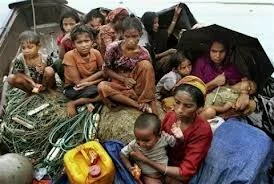 One of the best kept secrets currently in the western world is the humanitarian catastrophe taking place in Myanmar’s Rakhine state where we have seen reports over the last few weeks of Rohingya Muslims being murdered, raped and displaced in clashes with members of the local Buddhist population and Burmese security forces.
One of the best kept secrets currently in the western world is the humanitarian catastrophe taking place in Myanmar’s Rakhine state where we have seen reports over the last few weeks of Rohingya Muslims being murdered, raped and displaced in clashes with members of the local Buddhist population and Burmese security forces.
Over the holy month of Ramadhan, the treatment of the Muslim minority in Myanmar and the silence from the rest of the world was a topic of conversation and consternation in Mosques around our country.
Human Rights Watch claims that security forces have killed and raped members of the Rohingya group and arrested hundreds of others. Over the last week Channel 4 had the first reports from any Western journalists in which they filmed the previously bustling town of Narzi, in the city of Sittwe, now a deserted wasteland – homes raised to the ground – and its 10,000 inhabitants nowhere to be seen. Refugees who are now languishing in camps far from their home town with little food or adequate resources to sustain them were also spoken to in the report.
This current wave of violence erupted on the 4th June after 10 Muslim men were killed when an angry crowd attacked a bus in the Taungup district, apparently mistakenly believing some passengers were responsible for the murder and rape of a young Buddhist woman in Rakhine in May.
Although the historical ties of the Rohingya people to Myanmar is disputed, what is certain is that they have a long history of persecution and suffering in the region.
The Myanmar government considers them to be recent migrants from what is modern day Bangladesh and as a result, the country’s constitution does not include them among indigenous groups qualifying for citizenship.
Building an accurate picture of the situation on the ground is extremely difficult due to the Burmese authorities stopping journalists and aid workers from getting to the most sensitive parts of the state.
Those Rohingya who manage to flee the violence face further anguish when trying to enter neighbouring Bangladesh, whose border control authorities have allegedly refused to take in any refugees, a clear violation of international law. They either turn back to the violence, or wait to die in open waters.
Whilst the world’s attention has been focussed elsewhere there is a real concern that gross human rights violations have been taking place.
If you look carefully it is possible to discover that our Foreign Secretary has issued a statement on the FCO website, which condemns the violence and offers the support of the UK government which he says
‘…stands ready to assist the government of Burma in its efforts to develop Rakhine State, to share our knowledge and experience of tackling the many complex and long-standing issues to be overcome…. and ‘to support an inclusive political settlement that protects the rights of all members of the local population.’
Despite this the Foreign Secretary’s statement, many now feel that our government should be saying and doing more. The statement issued so far does nothing to address this man made humanitarian catastrophe taking place in Myanmar. What compounds the disaster is the lack of awareness in the mainstream media about this. Where are the headline news reports? Why is the loss of human life and massive displacement of tens of thousands and corresponding atrocities only receiving scant attention in the media?
Our concern and anger about this issue should not just be due to the fact that these people are of Islamic faith, nor should we accept the claim that this shows “Muslim lives are cheap”. Our concern should also arise because they are fellow humans who are victims of sickening crimes and have nobody standing up for their human rights.
We urgently need to publicise and shine a light on the atrocities being committed in Rakhine State. Britain has influence over both Myanmar and Bangladesh. We need to demand that the Burmese authorities do all they can to stop, not escalate, the violence and that the international community do more to assist those who have fled persecution and those who can’t.
I have been in contact with both the Foreign Secretary, William Hague MP and the Secretary of State for International Development, Andrew Mitchell MP. Mr Mitchell has confirmed that the British government’s contribution of aid is reaching the Rohingya community in Myanmar through appropriate UN agencies. Also, whilst the government is ‘particularly concerned about the detention of, and reported targeting of, aid workers in Rakhine State’ they are ‘engaged in discussions with the UN about the (Response) Plan to ensure that it meets the most critical humanitarian needs’.
Mr Mitchell also confirmed that the Foreign & Commonwealth Office and the Office for International Development will be working closely together on this issue. My fears are that, without a co-ordinated response from both departments, there is a risk that the persecution of Rohingya could continue and/or the humanitarian crisis could escalate.
Thankfully there are early signs that Myanmar’s leadership are acknowledging the severity of the issue. Just this weekend it was reported that Myanmar has set up a commission to investigate the recent violence. The move was announced by President Thein Sein, who earlier rejected UN calls for an independent inquiry. The UN has welcomed this announcement, saying it could make “important contributions” to restoring peace.
President Sein also confirmed that the 27-member commission would include representatives from different political parties and also religious organisations.
Whilst we should welcome the announcement of this investigation by the Myanmar government, we should be wary of openly celebrating this until we see an end to the violence and displacement of the Rohingya people. This issue will not be resolved just because of the announcement of an investigative commission. We also need to see pragmatic and immediate action from the Myanmar authorities to stop the violence now. We must see that they are taking action against those people who are found to be committing these atrocities.
It is for this reason that we must keep up the pressure on our own government to voice its concerns on this issue to their counterparts in Myanmar, and why we must continue to publicise this wherever possible.
Because I still have concerns with regards to the effectiveness of the commission without, at the very least, some form of UN or independent participation within it, I have been in contact with the Myanmar Ambassador in London. Amongst some of the assurances we need are:
• As to the effectiveness and impartiality of the commission in both its investigative processes and reporting procedure.
• Anyone who is found to be guilty of initiating violence as a result of the commission’s findings will be subject to prosecution and punishment that befits the crimes that have been committed.
• The Rohingya community will be fairly treated throughout the commission’s investigation and they will also be given ample opportunity to offer evidence for consideration of the eventual outcome.
• The currently displaced Rohingya community will be allowed back into Sittwe without fear of reprisals and also given assistance in rebuilding their now damaged lives.
It is my hope that with sustained vocal support for the Rohingya community, we can make sure that this issue stays at the forefront of the minds of those in positions of power and influence, both here in the UK and also abroad.
SOURCE:The Muslim News
No comments yet.

















